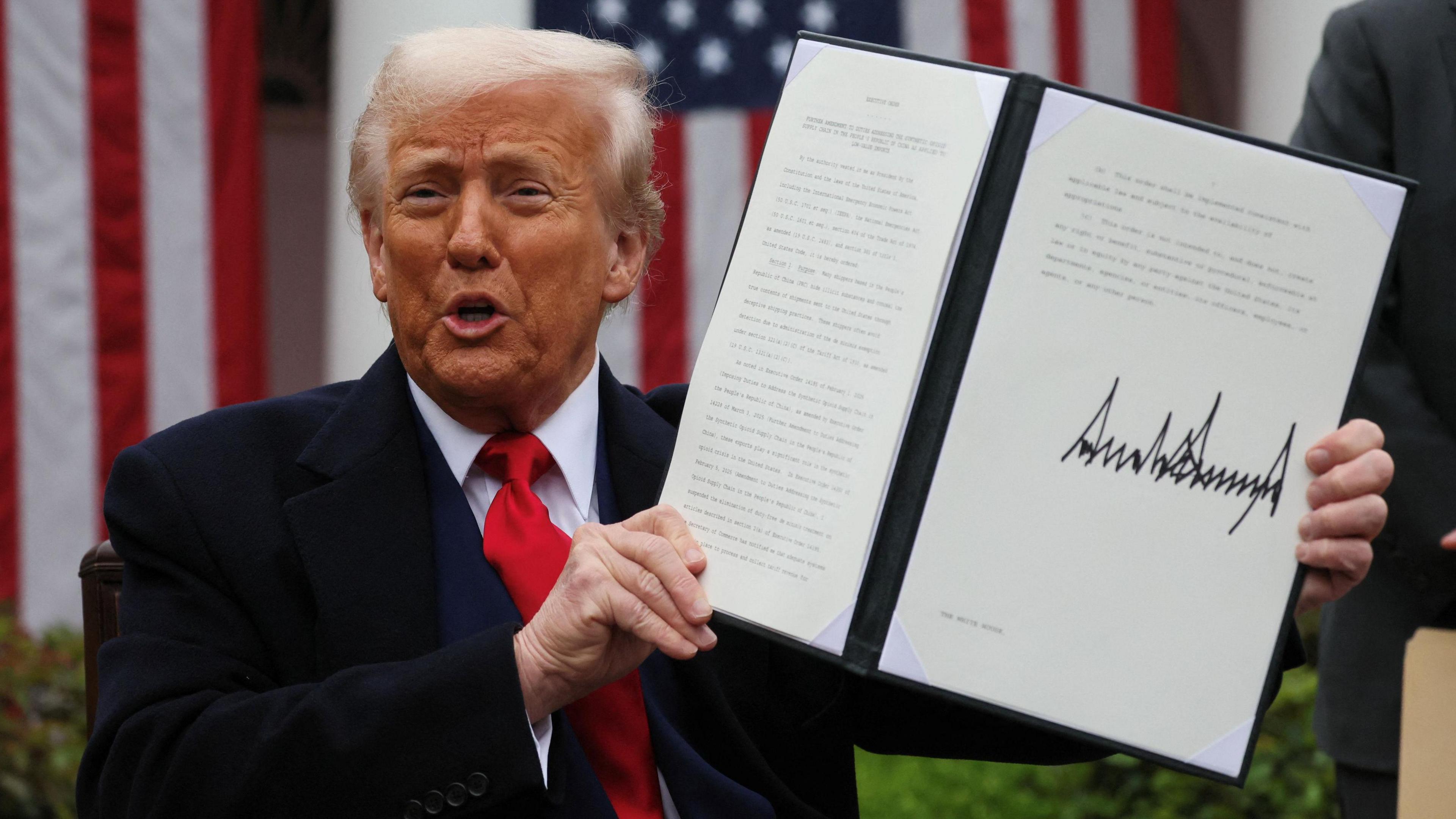Trump tariffs 'a race to the bottom', says first minister
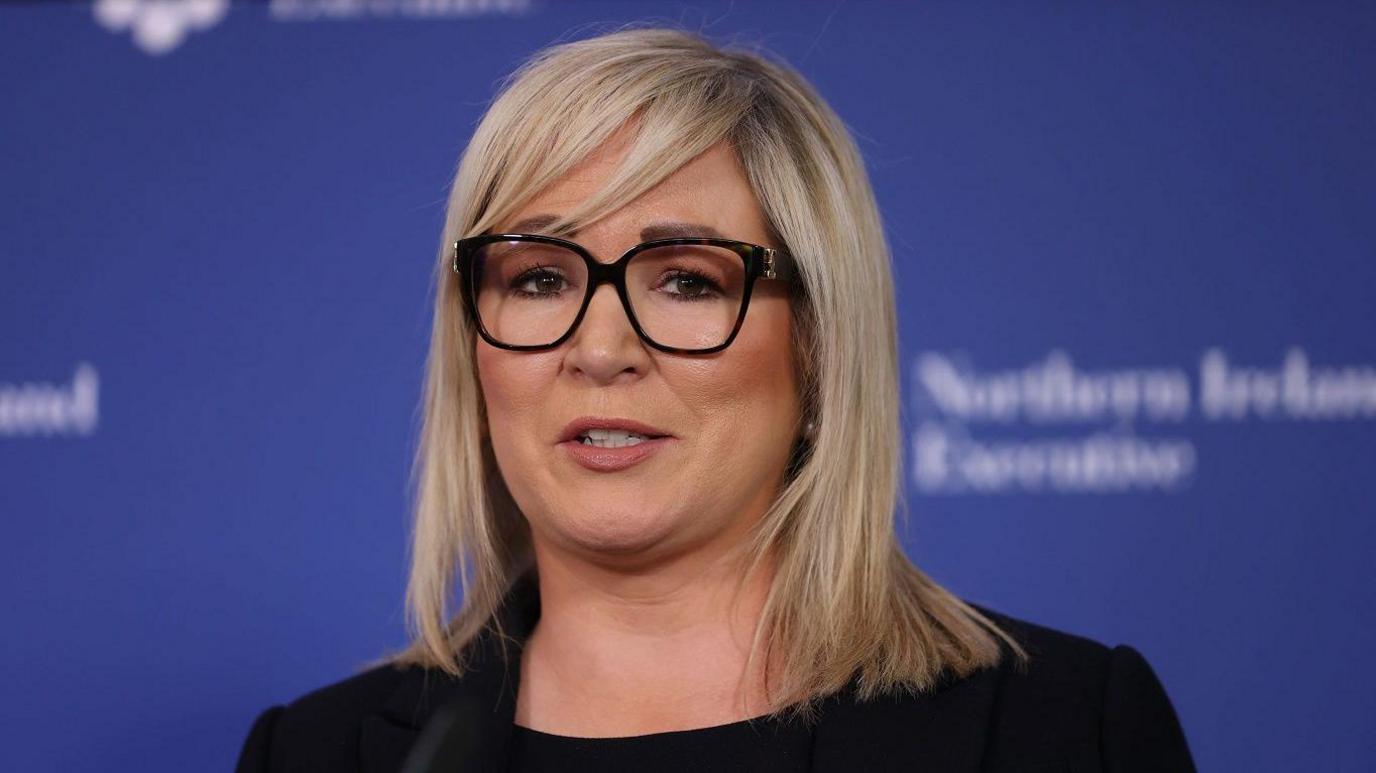
Michelle O'Neill said the tariffs would create instability
- Published
Tariffs announced by US President Donald Trump are a "race to the bottom", Northern Ireland First Minister Michelle O'Neill has said.
Northern Ireland goods entering the US will face a 10% tariff from Thursday, under a measure that has been imposed on the UK as a whole.
Meanwhile, goods from the Republic of Ireland will be hit with a 20% tariff as part of measures Trump has imposed on the EU.
"What was announced yesterday is concerning, it creates instability," O'Neill told a press conference at Stormont.
"It's very much a race to the bottom. It doesn't serve anybody's interests."
The Sinn Féin deputy leader said it was still an "unfolding situation".
"We're going to continue to work through that and to remain engaged on the tariff front," she said.
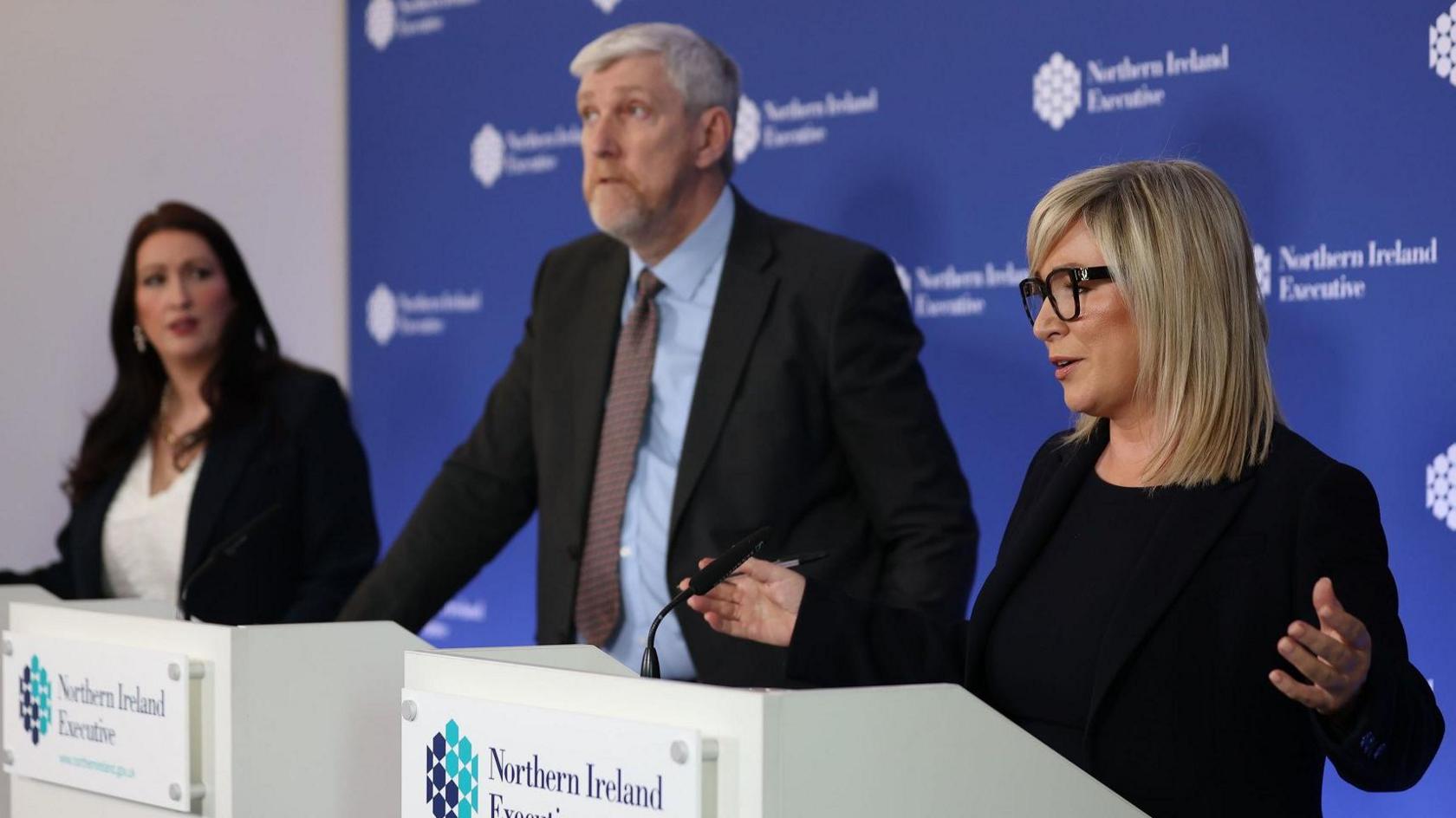
Deputy First Minister Emma Little-Pengelly, Finance Minister John O'Dowd and First Minster Michelle O'Neill held a press conference on Thursday
Deputy First Minister Emma Little-Pengelly said Northern Ireland businesses must not become "collateral damage" in a global tariff dispute.
The Democratic Unionist Party (DUP) minister said she would push to protect Northern Ireland from "any retaliatory tariffs by the EU".
"My focus will continue to be on doing all that I can to champion Northern Ireland and to protect our local businesses from being impacted from an escalation in tariff disputes, either directly or as collateral damage," she said.
Trump announced the measures on Wednesday as "our declaration of economic independence".
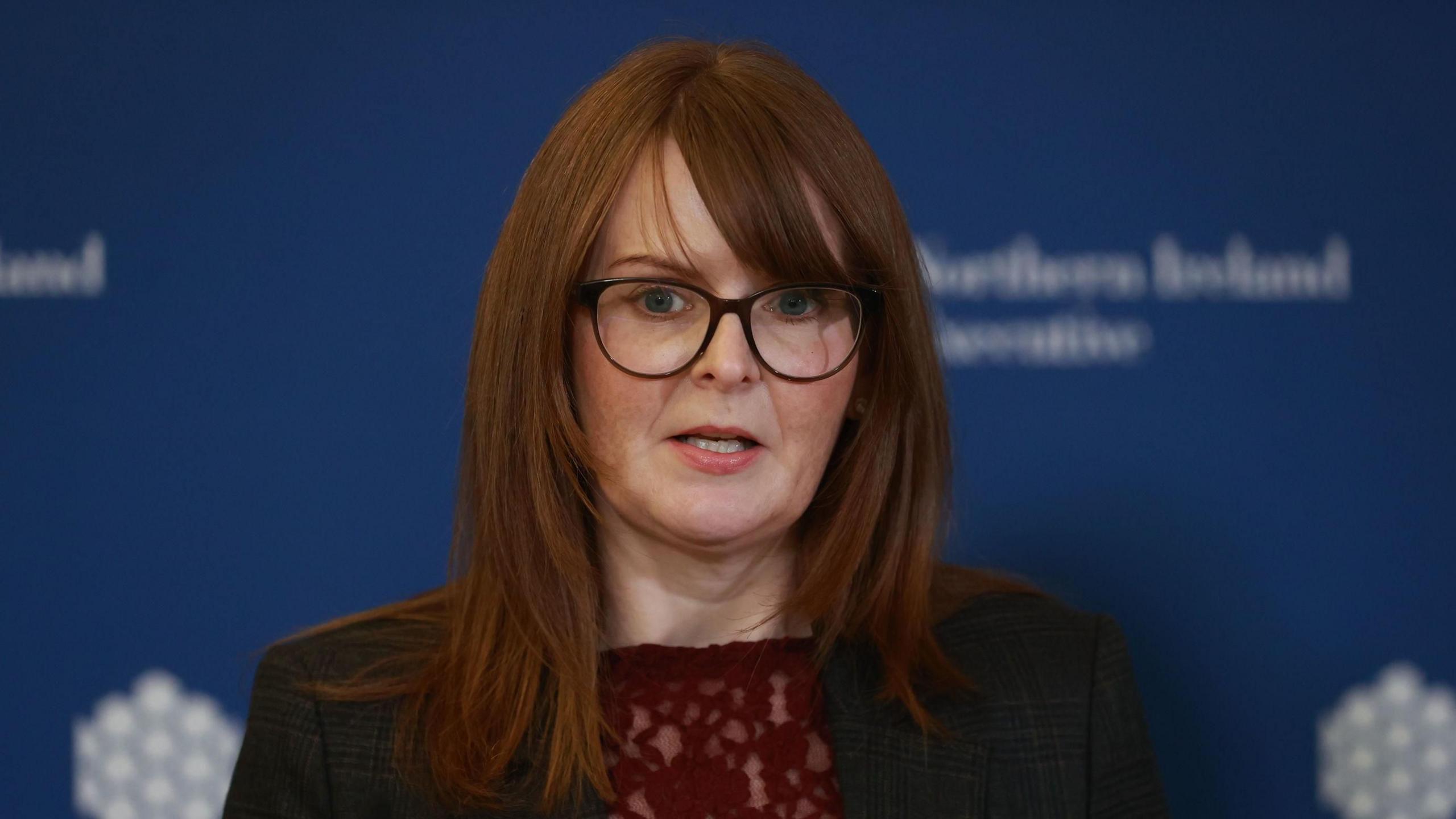
Caoimhe Archibald said a trade war would "only fuel inflation"
NI Economy Minister Caoimhe Archibald said the tariffs were "deeply regrettable".
She said a "trade war will only fuel inflation and risk recession", adding that she would "meet with businesses and trade unions to assess the unfolding situation, and the next steps".
Live updates: Reaction to Trump's tariffs announcement
Full story: Trump announces tariffs on NI and Irish goods
At a glance: What president's new taxes mean for EU, China and others
Prime Minister Sir Keir Starmer said the UK will respond with "cool and calm heads".
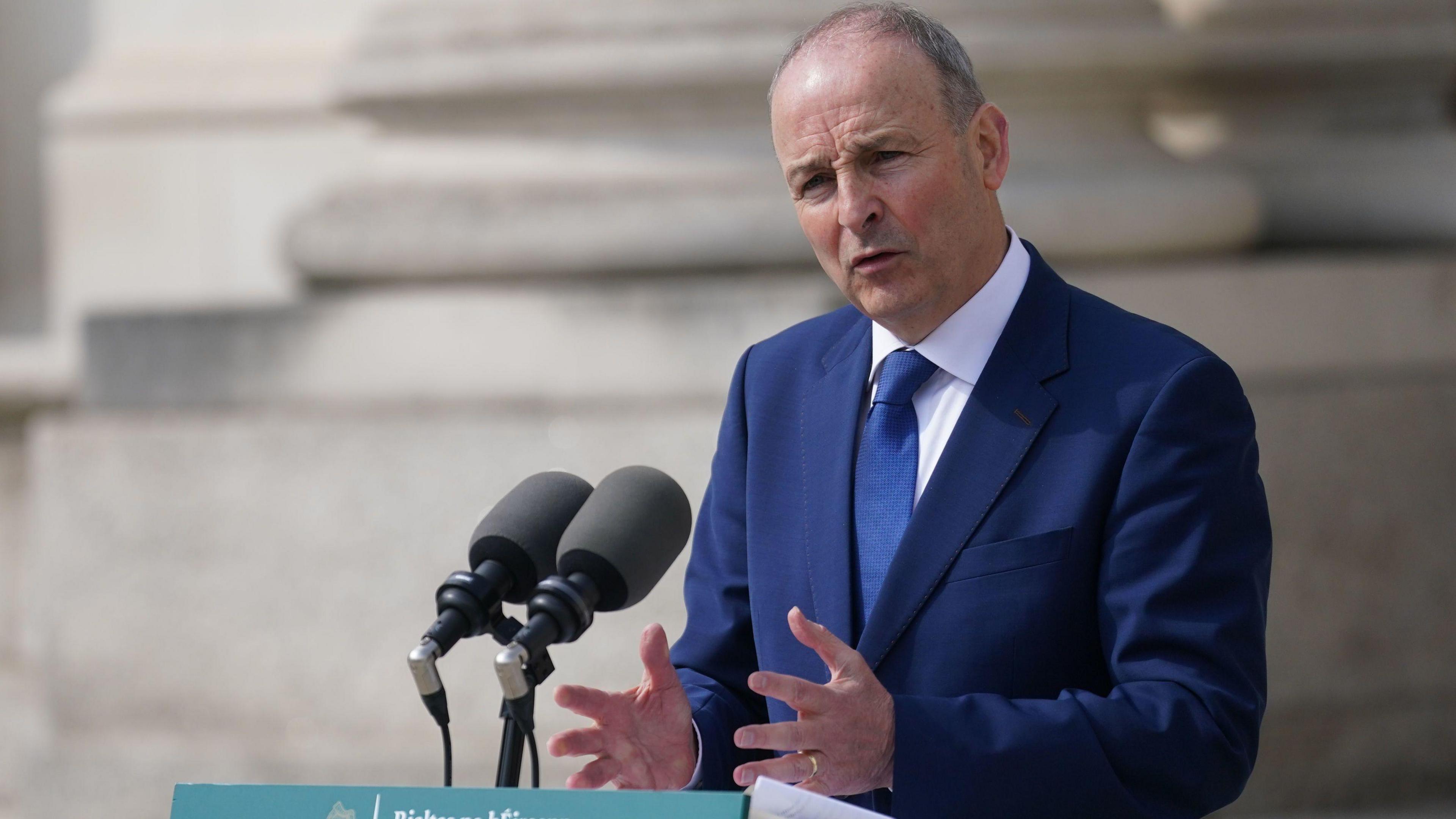
Micheál Martin said that "now is the time for dialogue" between the EU and US
The Irish Taoiseach (prime minister) said he "deeply regret[s]" the imposing of tariffs, adding that there is "no justification for this".
Speaking at a press conference outside Government Buildings in Dublin on Thursday, Micheál Martin said tariffs "drive inflation, hurting people on both sides of the Atlantic and they put jobs at risk".
He added that Ireland would "reflect with our European Union partners on how best to respond".
Martin called for a response that was "considered and measured".
"Now is the time for dialogue and I believe that a negotiated way for ward is the only sensible one, a confrontation is no one's interest."
The Taoiseach said that Ireland would be impacted, but said the county's economy was strong.
"We can and will weather this storm."
Also speaking at the press conference in Dublin, EU commissioner Michael McGrath said the bloc "stand ready to negotiate but we also stand ready to respond".
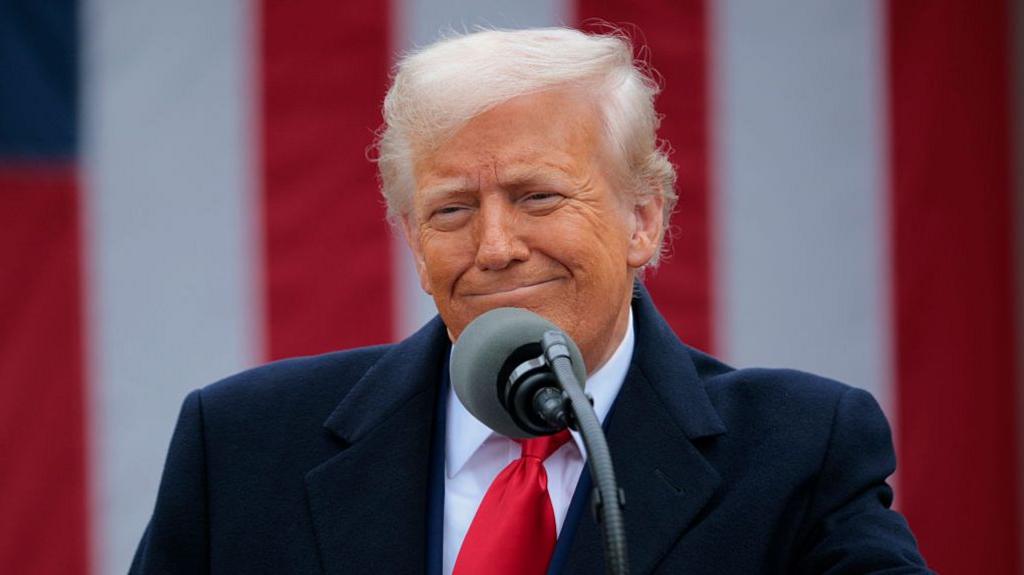
President Trump said the tariffs will make the US "wealthy again"
Businesses across the island, meanwhile, are trying to work out the full impact of the tariffs - Roger Pollen, head of the Federation of Small Businesses NI, said they cause "a lot of uncertainty, which is unwelcome".
What do the tariffs mean for Northern Ireland and Ireland?
Tariffs are effectively taxes applied to goods imported from other countries.
Governments impose them in the hope of protecting local manufacturers from international competition.
Northern Ireland firms that export goods to the US will be hit by the UK tariff of 10%.
Goods from the Republic of Ireland face a 20% tariff - and that is particularly serious for Ireland as, among EU countries, it is the most reliant on the US as an export market.
In 2024, almost a third of the country's total exports were to the US - worth €73bn (£61bn).
In addition, many US pharmaceutical firms have a major manufacturing presence in Ireland. Pharmaceuticals are not subject to these tariffs but are likely to face them in the future.
Speaking on Wednesday, Trump said: "Pharmaceutical companies are going to be coming roaring back, they're all coming back to our country because if they don't they've got a big tax to pay."
Meanwhile, Northern Ireland is in a unique situation where US goods entering the jurisdiction - which is a part of the UK - could be subject to retaliatory EU tariffs.
This is because, under post-Brexit trade arrangement contained in the Windsor Framework, goods coming into Northern Ireland must meet EU rules.
This means that even if the UK chooses not to act, any EU counter-measures will result in US goods entering Northern Ireland facing tariffs.
Gavin Robinson told BBC Radio Ulster's The Nolan Show that local businesses "must not become collateral damage" in a trade war between the US and the EU.
"For those businesses, particularly in Northern Ireland who are drawing product from the EU, where they're buying their product from is going to be impacted by tariffs," he said.
He said the prime minister has a role in ensuring Northern Ireland is not unfairly disadvantaged by retaliatory tariffs.
Analysis: Could NI benefit from announcement?
John Campbell, BBC News NI economics editor
After Brexit, Northern Ireland was left in a unique trading position.
Goods manufactured there have barrier-free access to both the EU single market and the UK market. No other UK region or European country has that arrangement.
That was supposed to make NI an attractive location for manufacturing investment- "the world's most exciting economic zone" the former Prime Minister Rishi Sunak called it.
That hasn't really happened - manufacturing performance has been muted.
But could the Trump tariffs inadvertently help fulfil some of that promise?
The 10% tariff on UK goods could give some NI exporters an advantage if they compete directly with producers in the Republic of Ireland who will face a 20% tariff.
Whiskey distilling is one example of that.
But this may be a relatively small benefit compared to the negative effect the Trump tariffs could have on global trade and economic growth.
What are Irish and NI businesses saying about the Trump tariffs?
Mark Prentice is commercial director of Copeland Distillery in Donaghadee, which exports whiskey, gin, vodka and rum. About 10% of its business goes to the US.
"Working across different US states already has its own complexities, but this now will make things that bit more difficult," Mr Prentice said.
He said the difference between the tariffs applied to Northern Irish goods and those applied to goods coming from the Republic of Ireland could provide somewhat of an edge.
But he added: "For us, the question is around competitiveness and whether or not we can get to a price point that allows consumers to buy our product.
"Clearly if there's a differential, that might give us some opportunities, but we're in a watch and see at the moment.
"The instability is causing us to think again about the investments we will make in the US."
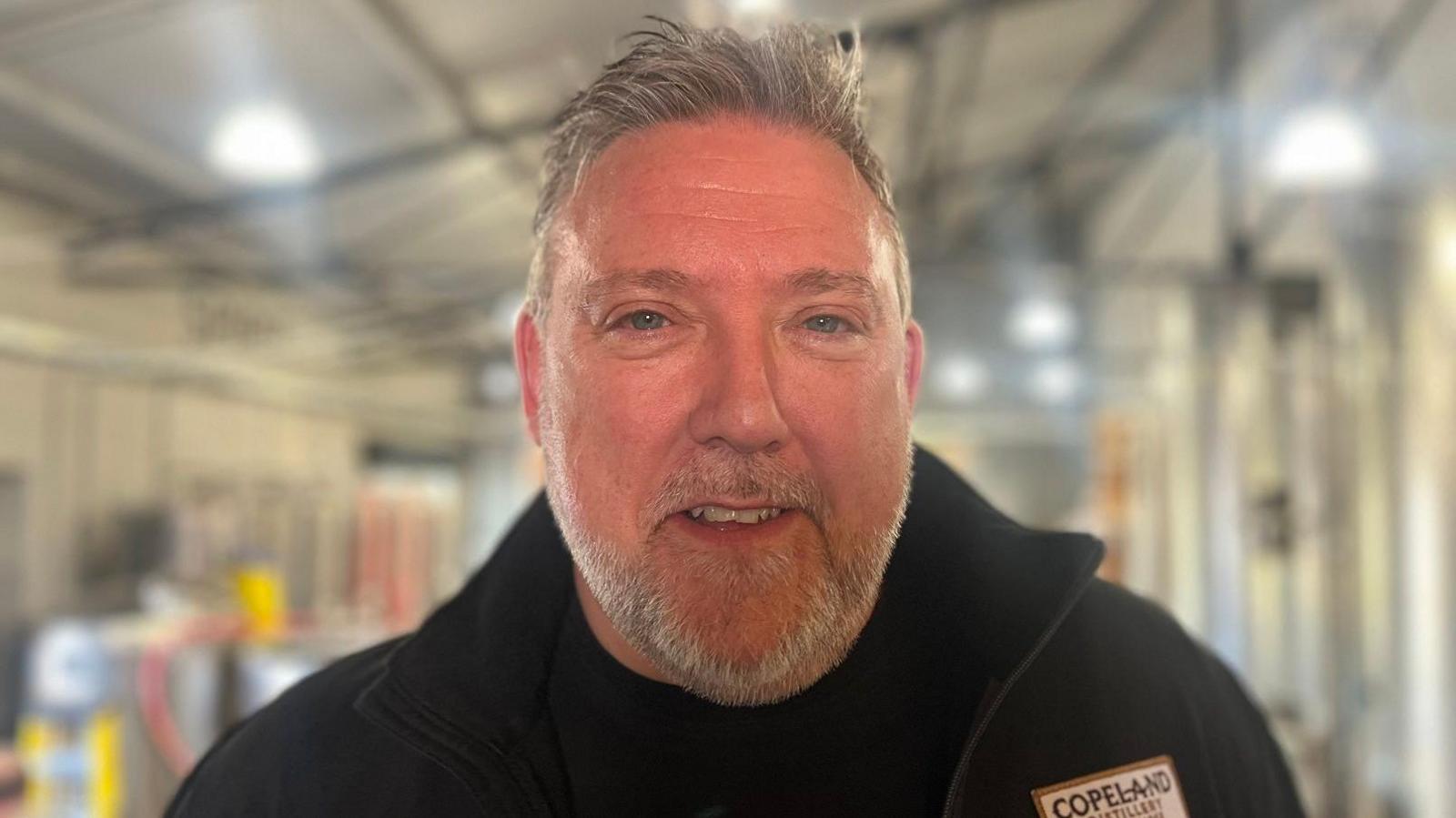
Mark Prentice said the tariffs will make things more difficult for his distillery
Peter Lavery opened Titanic Distillery 18 months ago and has been working on selling into the US market since then.
He is travelling to Miami on Monday and excited to start selling to the US - but says the announcement couldn't have been worse timing.
He now expects the projected number of bottles they will sell will be lower, but that they are still hoping to sell over half a million bottles this year.
Peter McAuley, founder of Belfast watchmakers Nomadic, said he had a "little bit of a sigh of relief" when he heard the announcement.
"In the last few weeks there's been so much uncertainty, we were probably preparing for a little bit worse and to see 10% - we're not delighted, it's not great, but it's better than it could have been," Mr McAuley said.
"Switzerland have been hit with 31% tariffs and obviously the Swiss watch industry is ginormous and that's our main competitors.
"We've got a really positive outlook on the US now because in terms of our Swiss competitors and other EU competitors we've got a bit of an opportunity to really put Belfast and Northern Ireland on the map in terms of watch-making."

Watchmaker Peter McAuley said the higher tariff on Switzerland did provide and opportunity for his company Nomadeic
Roger Pollen, from the Federation of Small Businesses NI, said they're working out "where the cost is going to fall".
"All of those sorts of things will shake out over time but at the moment it causes a lot of uncertainty which is unwelcome."
He added: "I wouldn't want to suggest that 10% is low and that it's not going to cause immense problems for a lot of people.
"I think it's just lower than might have been feared."
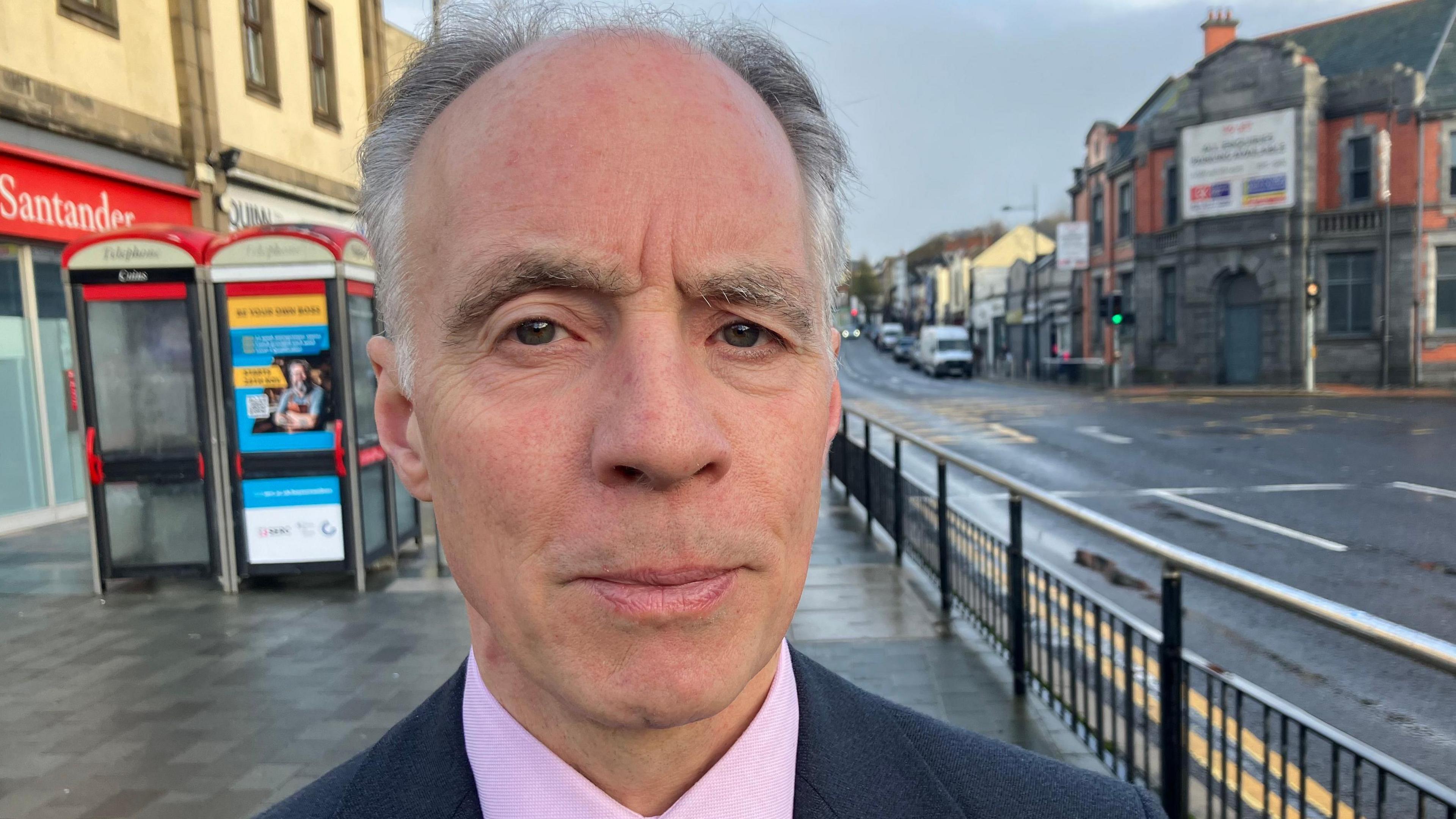
Roger Pollen, from the Federation of Small Businesses NI, said the impact of the tariffs was not yet clear
Fergal O'Brien, of the Irish Business and Employers' Confederation (Ibec), said the tariffs were bad news for the global economy.
He said the "UK was in a less bad position this morning", compared to Ireland.
"Ireland and Europe has a larger trade deficit with the US and that's the crudeness through which this has been calculated," he told BBC News NI.
He said about every €3 in €100 euros in export goods are affected by the tariffs - but that is without any future tariffs on pharmaceuticals.
"If the US extends these tariffs to all exports from Ireland to the US, then it would be about one in 10 of our export euros would be impacted by these tariffs, so we still have 90% of our export trade not impacted."
Mr O'Brien said he was also concerned about the challenges the tariffs would pose for the Windsor Framework going forward.
Jim Nash, joint owner of the Wild Atlantic Distillery, near Castlederg, County Tyrone, said the tariffs are "everything we feared", and that he was concerned an EU or UK response could provoke further US action.
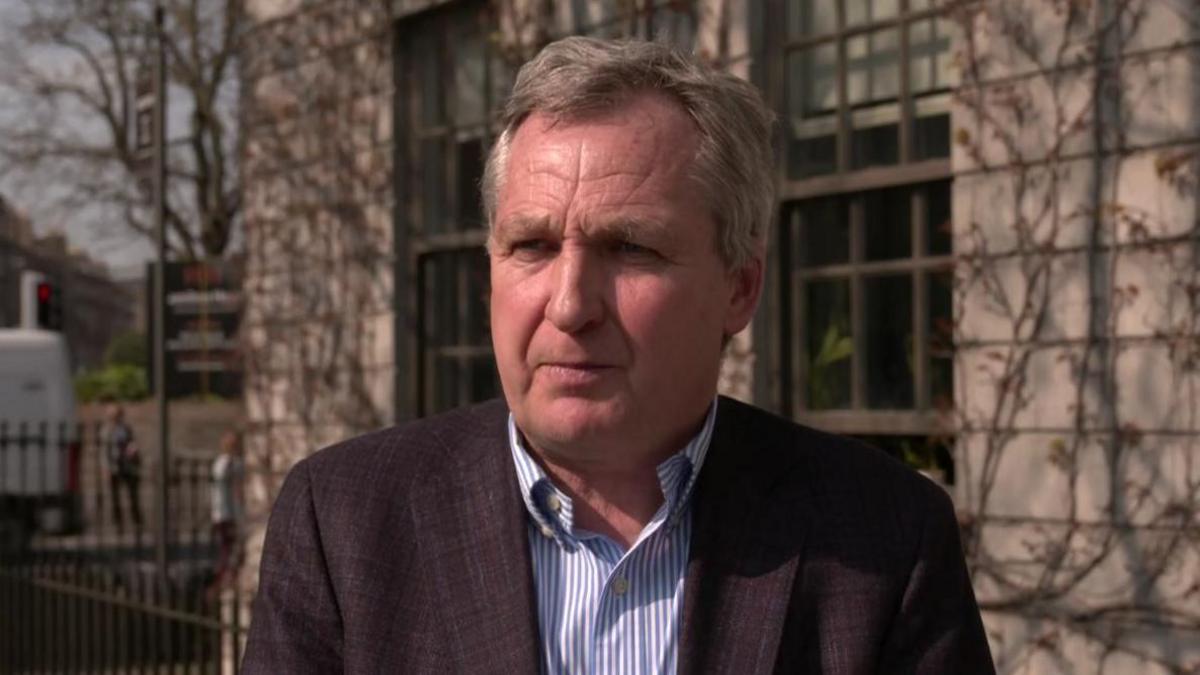
Cathal Friel said companies would work around the tariffs
Irish entrepreneur Cathal Friel, chairman of Poolbeg Pharma, said: "Democracy's a great thing – the mid-term election's only 15 months away, general election for the president is only three years away.
"So I think we need to live with these tariffs in the short-term
"There'll be work-arounds and it's not the end of the world.
"This is not a repeat of 2007, the great financial crisis – they'll work around it."
- Published1 April
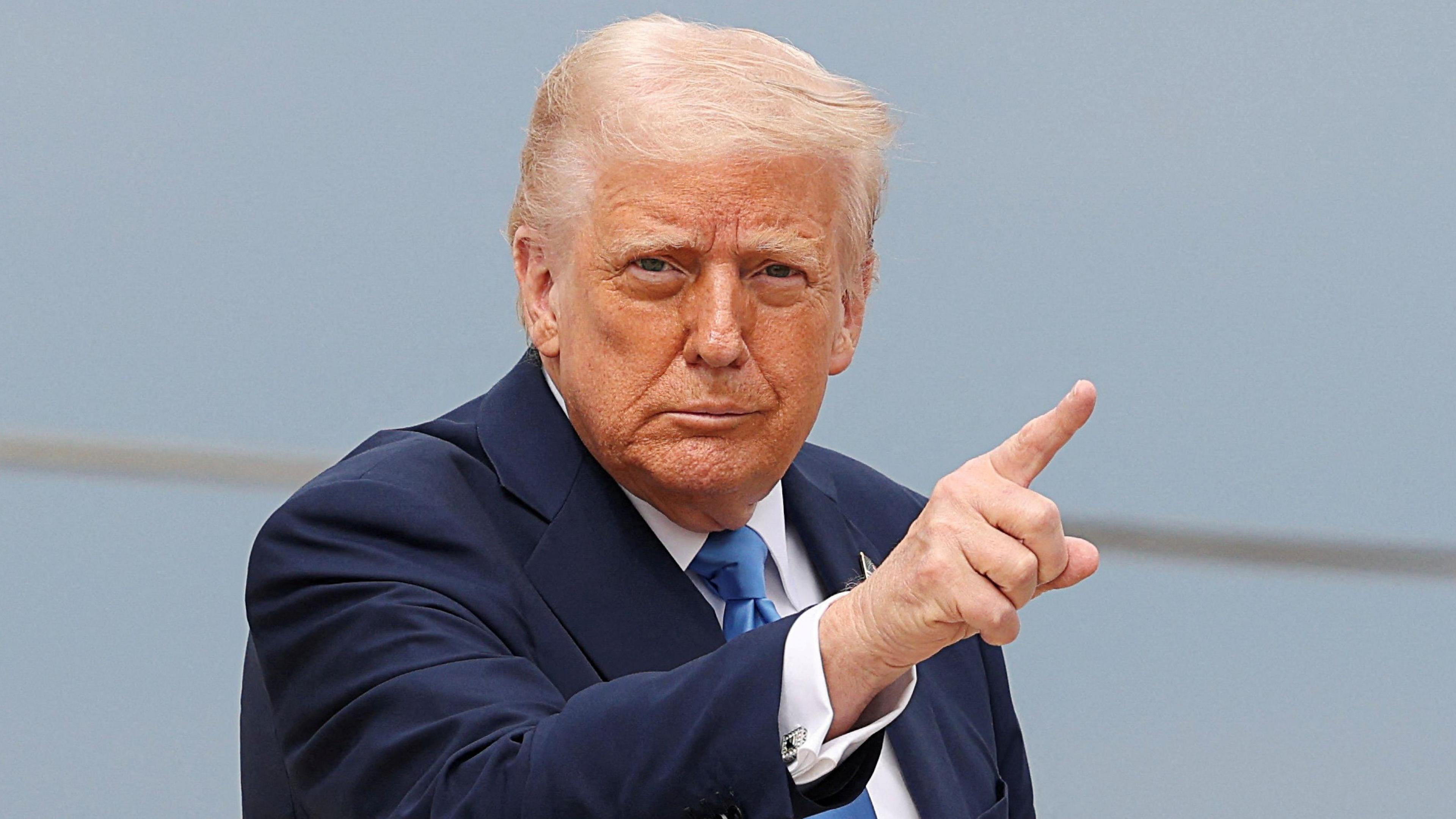
- Published5 November
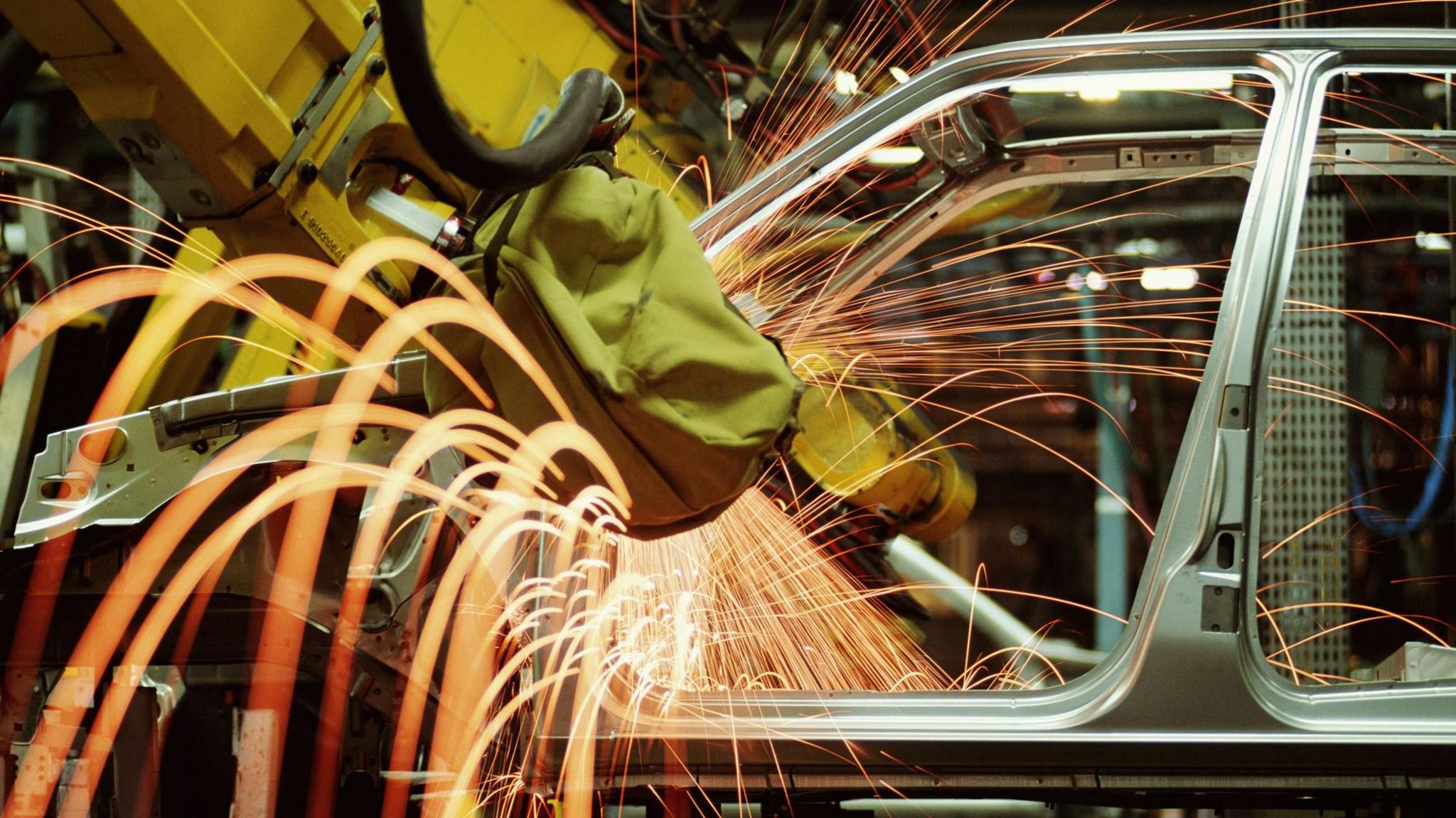
- Published13 March
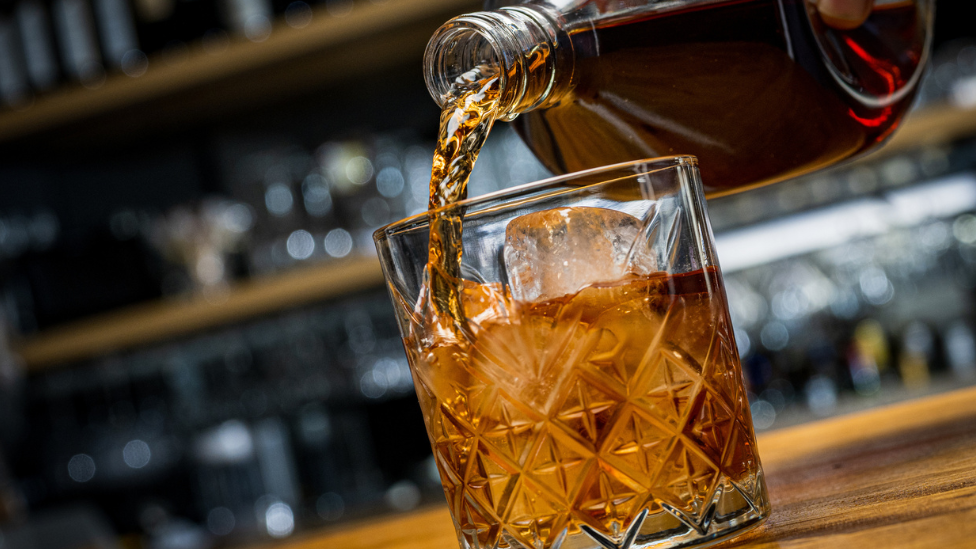
- Published3 April
